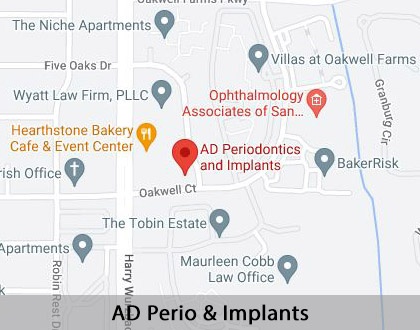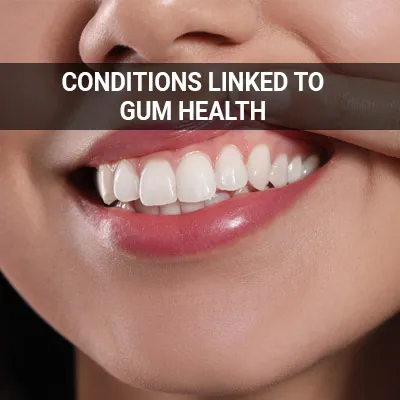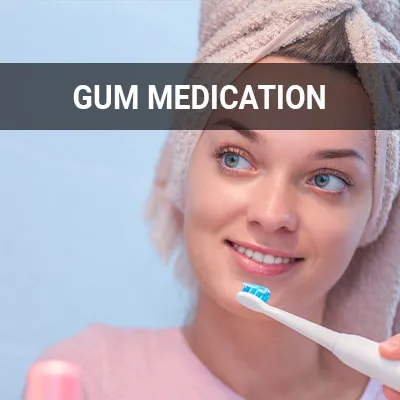Oral Inflammation San Antonio, TX
Oral inflammation occurs when the tissues of the mouth are inflamed and feel sore, swollen, or hot. Inflammation and swelling are body reactions to an injury, infection, or virus. Patients who are experiencing oral inflammation should make an appointment for a complete exam. More often than not, inflammation is a symptom of a more serious condition.
When left untreated, oral inflammation can lead to more severe damage, affecting the gums and bones that support the teeth. Treatment for oral inflammation is available at AD Perio & Implants in San Antonio and the surrounding area. Call us at (210) 805-8400 to learn more or schedule an appointment.
Oral Inflammation Defined
Oral inflammation is the body's response to an infection or injury in the mouth. The two types of oral inflammation are acute and chronic. Acute inflammation is often minor, similar to burning the roof of the mouth or tongue on a hot slice of pizza. This type of inflammation usually heals in a few days. Chronic inflammation lasts longer, typically caused by gum disease.
Inflammation in the mouth can appear as swelling or look like ulceration. It can also look or feel like a bruise or blister. Regardless of how it looks, patients should visit a dental professional as soon as symptoms arise.
Periodontal disease and oral inflammation are closely linked. In its early stages, it is called gingivitis. In its severe stages, it is called periodontitis. According to the Centers for Disease Control and Prevention, almost half of all adults aged 30 years and older have some form of periodontal disease. The earlier the condition is detected, the more effective treatment can be.
“Oral inflammation is the body’s response to an infection or injury in the mouth.”
Common Causes
Oral inflammation can be the result of several different factors, from environmental influences to oral and general health conditions. Gum disease is the most common cause of inflammation. Other common causes include:
- Canker sores
- Chemotherapy
- Dental hardware irritation
- Hormone changes
- Neglecting oral hygiene such as brushing or flossing
- Tobacco use
- Viruses
In most cases, we assess patients' risk factors and examine their specific conditions to find the root cause. Understanding their current oral and general health helps us determine the right course of action when developing a treatment plan.
“Oral inflammation can be the result of several different factors ranging from environmental influences to oral and general health conditions.”
Oral Inflammation Symptoms
Oral inflammation caused by gum disease has symptoms that include red, tender, or swollen gums. Symptoms can also include gums that bleed when touched, loose teeth, evidence of pus along the gum line, pain when chewing, tooth sensitivity, and bad breath. Any of these symptoms should be examined by a dental professional.
Symptoms of other types of oral inflammation, such as canker sores or cold sores, can include ulcers inside the lips, cheek, or tongue, along with red patches, blisters, and swelling. These conditions often heal themselves after a few days or can be treated with over-the-counter medications and mouthwash. If they refuse to heal or are chronic, a physical examination may be needed.
“Oral inflammation caused by gum disease has symptoms that include red, tender, or swollen gums, gums that bleed when touched, loose teeth, evidence of pus along the gum line, pain when chewing, tooth sensitivity, and bad breath.”
Check out what others are saying about our dental services on Yelp: Oral Inflammation in San Antonio, TX
Risk Factors
Several factors may put one at an increased risk for oral inflammation. These factors include hormonal changes stemming from pregnancy or menopause, genetics, medications that cause dry mouth or gum changes, and systemic diseases like diabetes that compromise the immune system. Understanding common risk factors can help patients and practitioners identify issues sooner.
Also, some lifestyle habits can increase one's risk, including tobacco use, poor diet, and recreational drug use. People who have a lot of stress in their lives are also at higher risk for oral inflammation. High amounts of stress can increase levels of a specific hormone called cortisol, which has been proven to cause inflammation and swollen gums.
“Several factors increase your risk for oral inflammation.”
Questions Answered on This Page
Q. What are the causes of oral inflammation?
Q. What are the symptoms of oral inflammation?
Q. What are the risk factors for oral inflammation?
Q. What are some treatment options for oral inflammation? What are some things I can do at home?
People Also Ask
Q. What health conditions affect the gums?
Q. What conditions require gum medication?
Q. What can an oral cancer screening reveal?
Q. What are the symptoms of periodontitis?
Oral Inflammation Treatment
After an oral exam, a dental professional can determine if the inflammation results from a minor injury or a more serious condition. We may recommend an antibacterial mouth rinse to treat some types of inflammation and sores. If the cause of the oral inflammation is a more serious form of gum disease, a different approach may be necessary. More extreme cases of gingivitis or periodontitis may require scaling and root planing. This procedure involves plaque and tartar removal below the gum line and along the roots of the teeth. That allows the gums to heal and reattach to the tooth.
Following any treatment for oral inflammation, patients can do things at home to maintain a healthy mouth. Maintaining proper oral hygiene, such as brushing twice a day and flossing daily, remains vital. Make sure brushing is not too rough as that can damage essential enamel surfaces that protect the teeth. Intense brushing can also damage and inflame the gums. Daily flossing helps remove remaining food particles between the teeth, which may lead to inflamed gums if not removed. Mouthwashes and toothpaste formulated especially for the gums can also be helpful. Our team can help patients discover ways to reduce oral inflammation and improve their oral health.
“More extreme cases of gingivitis or periodontitis may require a treatment called scaling and root planing.”
Frequently Asked Questions
Q. How can I reduce oral inflammation?
A. You can use several techniques to help lower your risk for oral inflammation. They include using appropriate brushing techniques, flossing daily, using proper toothpaste and mouthwash, improving your diet, and reducing stress. However, if you find your oral inflammation getting worse, contact a dental professional.
Q. How does oral inflammation impact my overall health?
A. Chronic inflammation (like what gets found in gum disease) has gotten linked to an increased risk of other conditions, including stroke and heart disease. That is called the oral-systemic link. So staying on top of your oral health can potentially reduce your risk for other health conditions.
Q. What are some causes of gum inflammation?
A. The buildup of plaque on the tooth's surface and along the gum line often causes gum inflammation. In addition, when bacteria in plaque come into contact with the gums, it triggers an inflammatory response. Therefore, it is essential to address plaque through better oral hygiene and regular dental visits to prevent worsening gum inflammation.
Q. What happens if chronic oral inflammation goes untreated?
A. Chronic inflammation of the gums can progress into severe periodontitis. The constant inflammation causes the gums to pull away from the tooth and form pockets. That makes it easier for bacteria to enter the gums and can eventually lead to tooth loss.
Q. What does oral inflammation reveal about the mouth?
A. In most cases, oral inflammation is a reaction caused by another condition. It can also be a product of poor oral hygiene. Inflammation can reveal various oral and general health conditions such as gingivitis, periodontitis, and oral cancer. It is important to visit a dentist immediately to examine the cause of inflammation and undergo treatment.
Start Feeling Better – Visit Us Today
By visiting us as soon as possible, our team can help get you the professional treatment you need. Instead of waiting around and allowing the symptoms to get worse, we can provide you with treatment options.
Definitions
Learn More About Oral Inflammation
You do not have to live with the pain and discomfort that comes with oral inflammation. Our team can diagnose your condition by finding the root cause and providing the treatment you need to achieve a healthy smile. Call AD Perio & Implants at (210) 805-8400 to schedule an appointment.
Helpful Related Links
- American Academy of Periodontology (AAP). American Academy of Periodontology (AAP). 2023
- Center for Disease Control and Prevention (CDC), Periodontal Disease Page. Center for Disease Control and Prevention (CDC), Periodontal Disease Page. 2023
- WebMD, What Is a Periodontist?. WebMD, What Is a Periodontist?. 2023
About our business and website security
- AD Perio & Implants was established in 2020.
- We accept the following payment methods: American Express, Cash, Check, Discover, MasterCard, and Visa
- We serve patients from the following counties: Bexar County, Kendall County, Comal County, and Guadalupe County
- We serve patients from the following cities: San Antonio, Alamo Heights, Terrell Hills, Universal City, Boerne, Stone Oak, New Braunfels, Bulverde, Fair Oaks Ranch, Garden Ridge, Selma, and Castle Hills
- Norton Safe Web. View Details
- Trend Micro Site Safety Center. View Details
Back to top of Oral Inflammation







